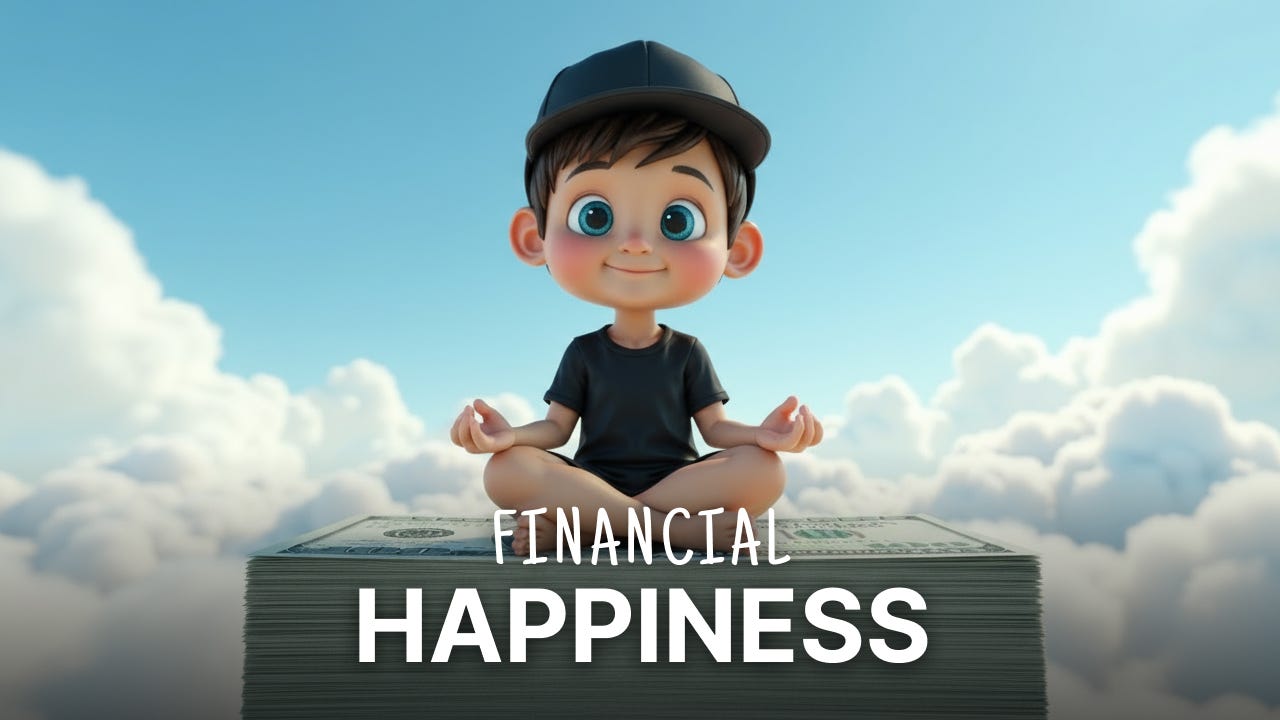The Financial Happiness Equation
Being content vs comfortable
Hey Friends! It’s been 774 days since I started my walk to wealth journey. It’s hard to believe the portfolio is closing in on my first 100k. We’re currently sitting at $87,552.
Side Note: if you’ve been sitting on the fence about investing, I get it, but I promise you that you won’t regret it. Just get started!
Last week, we went deep on Google, today we are just going deep! It’s going to be a fun one…
Lately, I’ve been digging into Morgan Housel’s newest book, The Art of Spending, and one concept immediately stuck out. And by stuck out, I mean completely changed my mindset on money.
It’s an equation that distills financial happiness down to its core:
Happiness = What You Have - What You Want
It’s a simple, yet profound formula. Take a second to soak it in.
I think most of us stop on the first half of the equation, chasing “What You Have” as the key to happiness.
But here’s the catch: If we stop there, we’ll always be on the hunt for more.
The real magic happens on the “What You Want” side. Because the fewer desires we chase, the easier it is to feel fulfilled by what we already have.
That’s where comfort and contentment collide: Comfort is having enough, but contentment is wanting less.
I believe understanding the subtle difference between these two is the most important lesson on our journey to genuine wealth. Let’s unpack this!
Being Comfortable is an External Metric
To be comfortable, in a financial sense, is to achieve a state of ease and security based on your external reality. It means your resources consistently cover your needs and a good portion of your wants. It’s the peace of mind that comes from:
A healthy savings cushion.
An income that supports your lifestyle without constant struggle.
The ability to pay bills, travel, and handle unexpected expenses without worry.
Comfortable is your financial circumstances relative to your expenses. As Housel suggests, money is an excellent tool for buying this comfort and the independence it affords. It minimizes stress and buys you time. Two ingredients helpful for a better life.
Being Content is an Internal State
Contentment, however, is an entirely different beast. It’s an internal psychological state: a deep sense of satisfaction and appreciation for your current life, regardless of your exact financial status.
Contentment is the ability to find joy in what is, rather than being distracted by what could be. Housel argues that,
“enduring happiness is found in contentment, so those happiest with money tend to be those who have found a way to stop thinking about it.”
He also suggest that money is like leverage.
If you’re already happy and get more money, you’ll most likely be more happy. Those who are unhappy when they acquire money, usually end up being more unhappy.
Contentment liberates you from the endless cycle of wanting more. It allows you to value, appreciate, and even marvel at your money without letting it control your identity or personality.
The Moving Goalpost
Here is the crucial distinction:
You can be financially comfortable but profoundly discontent. If your desires (the “What You Want”) continuously expand with every raise you get, you’ll feel like you’re falling short. This is the core problem of lifestyle inflation, where financial comfort is quickly replaced by new, more expensive aspirations. The comfortable life can quickly become a treadmill.
Conversely, you can be profoundly content with a modest, functional income because you have a firm handle on your desires. This person has mastered the “What You Want” side of the equation, making a modest “What You Have” feel like an abundance.
Contentment is the essential ingredient that converts financial comfort into sustainable happiness. Without it, comfort is just a temporary fix, quickly overshadowed by new expectations and desires.
A Walk to Wealth Contentment
So, if we agree that contentment is the ultimate key to Housel’s happiness equation, how do we cultivate it? Here’s a few practical ways I’ve been leaning into contentment. Maybe they will help you along your journey as well.
Define Your “Enough”: Stop letting society or your neighbors dictate your goals. Determine the level of comfort that grants you independence, and consciously try to resist letting your desires rise much beyond that point.
Practice Intentional Spending: Housel’s antidote is to “spend for utility, not status.” (Another great chapter in the book!) If a purchase doesn’t genuinely improve your life, it’s likely a desire born from comparison—and it won’t lead to contentment.
Appreciate the Current Moment: Spend less time thinking about the money you’re trying to make, and more time enjoying the life you’ve already built with the money you have.
Being financially comfortable is a necessary and worthy goal on our walk to wealth. But true freedom lies not in the size of the numerator (What You Have), but in mastering the denominator (What You Want).
As I’ve been reading through The Art of Spending, I’ve been collecting quotes left and right and want to leave you with this one.
“The person who has everything but wants even more, feels poorer than the person who has little but wants nothing else”
Let me know what you think about this style of post. Too deep or just right?
Until next time, keep walking!
Jeremy ✌️
Disclaimer
This article is for informational and entertainment purposes only. I am not a financial advisor, broker, or tax professional. The information provided reflects my personal opinions and experiences as an individual investor and may not be accurate or current. All investment strategies and investments involve risk of loss. Any ideas presented may not be suitable for all investors and may not take into account your specific investment objectives, financial situation, or needs. Past performance is not indicative of future results. Always conduct your own due diligence and consult with qualified financial professionals before making any investment decisions.


